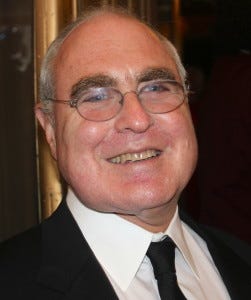'BEAUTIFUL' REAL ESTATE AIDS ROUNDABOUT REVIVAL

Todd Haimes at the 2015 Tonys. Photo: Broadway Journal
EXCLUSIVE: On September 15, 2008, hours after Lehman Brothers filed for bankruptcy, the Roundabout Theatre Co. signed a lease to take over a third Broadway house. Given the expense of producing and its thinning ranks of subscribers, some in the business questioned whether the company, founded in 1965, overextended itself.
Seven and a half years later, the Roundabout can make a convincing case that adding the Stephen Sondheim Theatre inside the Bank of America tower constituted shrewd investing in a downturn.
The country's largest nonprofit theater by budget, which Todd Haimes manages as artistic director and board president, recently reported a second consecutive operating surplus after years of deficits. For the 12 months ending in August 2015, revenue, contributions and grants soared 26 percent to a record $79 million. Net assets rose 12 percent to $89 million. Haimes, not known for hyperbole, called 2014-15 "a perfect season."
The Roundabout's enjoyed a string of popular and critical successes, including musical revivals of On the Twentieth Century and Cabaret (which extended from the previous season) and the new play Significant Other. (The Humans, which opened this season at its off-Broadway space, recently transferred to Broadway under the aegis of Scott Rudin.) Yet in recent years, playing the role of landlord was more profitable than any of its own shows. Subletting the Sondheim to an outside commercial production, Beautiful: The Carole King Musical, helped it increase rental income 20-fold since 2012, to $8.4 million last season, after subtracting for direct expenses. Also contributing to rental income was a three-month run of An Act of God, a commercially produced comedy in Studio 54, which the Roundabout owns.
Tina Packer, the founding artistic director of Shakespeare & Co. in Lennox, Massachusetts, said the Roundabout's subletting "makes sure theater is alive and well and serves their interests." Packer, who's taught at Columbia Business School, added that balance is key for any theater company. "If your for-profit arm starts running your not-for-profit arm, then you're in trouble."
The Roundabout enjoys a sweet lease for the Sondheim Theatre, formerly known as the Henry Miller's. Following a onetime $6 million bill for reconstruction, it paid rent and expenses in 2014-15 of just $672,000 , according to a filing. In an earlier period -- the year ending in October 2014 -- Beautiful on Broadway LLC's paid rent of $3.6 million, not including expenses, according to a production report filed with the offices of New York State Attorney General Eric Schneiderman. (More recent production reports weren't available.)
The developer Douglas Durst had approached Haimes about the Henry Miller's, which was being rebuilt inside the new Bank of America Tower at One Bryant Park. In addition to Studio 54, the Roundabout already leased the American Airlines Theatre on Broadway and the Steinberg Center off-Broadway. “The board said, ‘you are out of your mind,’” Mr. Haimes recalled on a podcast with Ken Davenport. “’You’re becoming like a megalomaniac.’”
Haimes said he won over the trustees, explaining that he could use the space either to produce or sublet, thus subsidizing its mission of creating new works, revivals and education programs. Years later, when Beautiful was announced, he pursued it as a landlord. "I figured, `If I’m obsessed with Carole King, anyone over 45, which is the target theater audience, is probably interested in Carole King too,'" Haimes told Davenport. The show is in its third year on Broadway. The Roundabout plans to produce in the Sondheim after Beautiful closes, a Roundabout spokeswoman said.
While financially more stable, the Roundabout isn't flush. Its $32 million of investments is less than a third of Lincoln Center Theater's nest egg. And it doesn't have the luxury of operating rent-free on city-owned land, like the Public Theater. Being a sometime landlord may not advance the art form, but it does improve the Roundabout's odds of producing for another 50 seasons.


